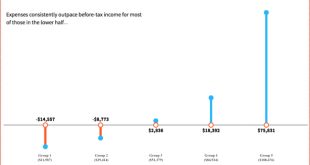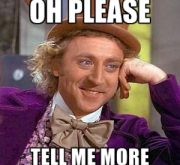Source: https://gshindi.com/category/national-issues/minimum-wage-proposal-big-risk
Read More »Rethinking public budget
from Lars Syll The balanced budget paradox is probably one of the most devastating phenomena haunting our economies. The harder politicians — usually on the advice of establishment economists — try to achieve balanced budgets for the public sector, the less likely they are to succeed in their endeavour. And the more the citizens have to pay for the concomitant austerity policies these wrong-headed politicians and economists recommend as “the sole solution.” One of the most effective ways...
Read More »Socialism or truth
from David Ruccio The liberal establishment continues to mourn the death of truth. Everyone else is moving on. Every day, it seems, one or another liberal—pundit, columnist, or scholar—issues a warning that, in the age of Donald Trump, we now live in a post-truth world. In their view, we face a fundamental choice: either return to a singular, capital-t truth or suffer the consequences of multiple sets of beliefs, facts, and truths. For example, just the other day, Keith Kahn-Harris [ht:...
Read More »Methodology of Modern Economics
from Asad Zaman My paper is a survey of the huge amount of solid empirical evidence against the utility maximization hypothesis that is at the core of all microeconomics currently being taught today in Economics textbooks at universities all over the world. It is obviously important, because if what it says is true, the entire field of microeconomics needs to be re-constructed from scratch. Nonetheless, it was summarily rejected by a large number of top journals, before being eventually...
Read More »The essence of scientific reasoning
from Lars Syll In science we standardly use a logically non-valid inference — the fallacy of affirming the consequent — of the following form: (1) p => q (2) q ————- p or, in instantiated form (1) ∀x (Gx => Px) (2) Pa ———— Ga Although logically invalid, it is nonetheless a kind of inference — abduction — that may be factually strongly warranted and truth-producing. Following the general pattern ‘Evidence => Explanation => Inference’ we infer something based on what would...
Read More »Utopia and mathematics
from David Ruccio In a recent article, Dan Falk [ht: ja] identifies a fundamental problem in contemporary physics: many physicists working today have been led astray by mathematics — seduced by equations that might be “beautiful” or “elegant” but which lack obvious connection to the real world. What struck me is that, if you changed physics and physicists to economics and economists, you’d get the exact same article. And the same set of problems. Economists—especially mainstream...
Read More »Where Donald Trump and the elites agree on protectionism: patents and copyrights
from Dean Baker Policy wonks and pundits have been nearly unanimous in their condemnations of Donald Trump’s trade war and his primary weapon of tariffs. Tariffs are a tax increase on US consumers, raising the price of imports and the domestically produced goods with which they compete. Retaliation by other countries will reduce US exports, costing jobs in other sectors. This is not likely to lead to good outcomes, especially when the basis for Trump’s complaints is vague, constantly...
Read More »“Another day older and deeper in debt”
from David Ruccio Most Americans are not loading sixteens tons of coal. But they are, even in the midst of the recovery from the Second Great Depression, sinking deeper and deeper into debt. According to a recent analysis by Reuters [ht: ja], the bottom 60 percent of income-earners have accounted for most of the rise in consumption spending over the past two years even as their finances have worsened.* The data show the rise in expenditures has outpaced before-tax income for the lower 40...
Read More »Lessons from Polanyi
from Jorge Buzaglo “Under the gold standard the leaders of the financial market are entrusted, in the nature of things, with the safeguarding of stable exchanges and sound internal credit on which government finance largely depends. The banking organization is thus in the position to obstruct any domestic move in the economic sphere which it happens to dislike, whether its reasons are good or bad. In terms of politics, on currency and credit, governments must take the advice of the...
Read More »The state of ‘New Keynesian’ economics
from Lars Syll The standard NK [New Keynesian] model, like most of its predecessors in the RBC literature, represents an economy inhabited by an infinitely-lived representative household. That assumption, while obviously unrealistic, may be justified by the belief that, like so many other aspects of reality, the finiteness of life and the observed heterogeneity of individuals along many dimensions … can be safely ignored for the purposes of explaining aggregate fluctuations and their...
Read More » Real-World Economics Review
Real-World Economics Review






